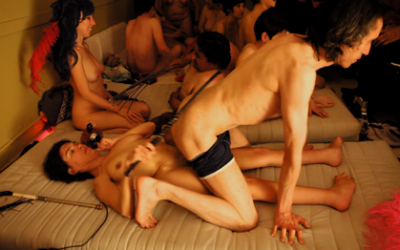What would your life be like if you couldn’t masturbate?
Sexual assistance, an essential support for people with functional diversity
by Andrea García-Santesmases
Desvelada | A feminist and anti-ableist look at contemporary representations of the body, gender, (dis)ability and sexuality, by Andrea García-Santesmases
“How beautiful it is to touch myself”, said Sole, a woman with a disease named arthrogryposis multiplex congenital, when her sexual assistant guided her hand through her body, the first time Sole had ever touched her own nipple… Can you imagine not being able to touch your body? Can you imagine having sensitivity and feeling it in each and every pore of your body, wanting to touch yourself, feeling the urgent need to masturbate, and not being able to do it because you can’t move? That is the life of millions of people, people who receive daily support for toileting, dressing or feeding, but don’t have any help with their sexuality because that doesn’t make it to the list of their “needs”. A sexuality that no one wants to see, that is not named. So when a person with functional diversity shows obvious signs of arousal, such as having an erection while being bathed, the carer looks away. In women’s case, the denial and silence is even stronger: there is no physical evidence of sexual arousal, therefore it does not exist.

[Picture taken from the documentary Yes, we fuck!, which also addresses the sexual assistance topic. Here you can see Teo’s hands caressing Sole.]
If you barely can picture the idea of not being able to touch your own body, now imagine what it would feel to not being able to touch your partner: having a relationship, being in love, wanting to have sex with another person and not being able to do it because you both have reduced mobility. You can look at each other, talk to each other, even maybe slightly touch each other, but you are not independent enough to undress, lay on bed, much less perform other sexual practices. Again, this is the situation of thousands of couples: people with functional diversity can’t have sex by themselves.
Sexual assistance emerges as a solution that is trying to solve this kind of situation: a support so people with functional diversity can access their sexuality. This is a controversial figure, yet to be defined. There are countries, groups and individuals already naming their services as “sexual assistance” but under this concept coexist different practices: some are plain and simple prostitution; others, sexological therapy with rehabilitation goals (like the one shown in the film The Sessions); that are even “voluntary” services in which “sexual assistance” is offered as altruist, as a kind of carnal begging that seeks to calm consciences and peremptory appetites. As you can see, these different versions of “sexual assistance” mix sexual desire; economic, professional or personal interest; legal restrictions; and social and moral prejudices.
As I examined in an academic article, each of them launches different strategies of social legitimacy. Some invoke to extreme cases to justify the desperation of the situation and the need to meet their demands. For example, in the recently released report “Jo també vull sexe” (“I also want sex” in Spanish), some of these ghosts are mobilized as “mothers who have to masturbate their children” or “the person with functional diversity who will die a virgin because no one wants to have sex with her. ” This kind of powerful images have the virtue of putting into spotlight a problem and educate the population. But they carry the risk of doing so at the cost of perpetuating equally harmful stereotypes such as the undesirability of these people or their lack of affection. This approach comes to an end by placing the problem in “disability”, rather than in a society that “disabled” certain individuals: depriving them of autonomy, locking them in residences, preventing them from accessing public places and transportation, or diminishing their self-esteem through bombardment of unreachable bodily models (harmful to us all).
From my point of view, you have to run from shortcuts of relief that after the sexual discharge leave such a bad taste. Sexual assistance can and should be a recognized as a right for people with functional diversity. But to do this, it has to be defined as a support to ensure equality of opportunities, ensuring people with functional diversity to be able to do what any of us do: masturbate, touch their own bodies, use a sex toy or maintain relationships with their couple. Nothing less that can be expected from the State. Sexual desire that exceed these practices, and which we all experience (with more or less satisfaction), cannot be structured by directives, without having to face the problems, doubts and concerns that govern the formulas of seduction. The chances of success will depend, for sure, on the accessibility of the spaces we are in and I am not referring only to physical barriers, but to the mental ones that constrict and impoverish our desire. Let us strive, therefore, to enlarge the imaginary of a beautiful body, of a desirable relation, of desirable sexuality, so that, indeed, Yes, we fuck!
OTHER POSTS FROM ‘DESVELADA’
¿Disability and sex? Yes, we fuck! | by Andrea García-Santesmases
Desvelada | A feminist and anti-ableist look at contemporary representations of the body, (dis)ability and sexuality, by Andrea García-Santesmases
Me Before You or, rather, “me without sex” | by Andrea García-Santesmases
Desvelada | A feminist and anti-ableist look at contemporary representations of the body, (dis)ability and sexuality, by Andrea García-Santesmases
Desiring and other fictions | by Andrea García-Santesmases
Desvelada | A feminist and anti-ableist look at contemporary representations of the body, (dis)ability and sexuality, by Andrea García-Santesmases
‘I am sexy and I know it!’ Viktoria Modesta y el deseo sexual por los cuerpos amputados | by Andrea García-Santesmases
Desvelada | A feminist and anti-ableist look at contemporary representations of the body, (dis)ability and sexuality, by Andrea García-Santesmases
“To fuck you must have imagination” Postporn and functional diversity | by Andrea García-Santesmases
Desvelada | A feminist and anti-ableist look at contemporary representations of the body, gender, (dis)ability and sexuality, by Andrea García-Santesmases



